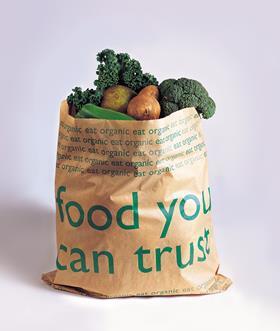
The 'moral satisfaction' that comes from eating ethically produced food has a measurable impact on the enjoyment of that food's taste.
Dr Boyka Bratanova and her team at Dundee Business School analysed the effect that ethical food production has on a consumer's taste experience.
To establish this finding, consumers were given identical food products to taste and score, but were told some of the food was produced ethically, and some was not. The research could now lead to new ways of measuring return on investment in ethical food production.
Bratanova said: 'There has been a huge, sustained increase in demand for ethical food around the world, and in the UK in particular. If this was just a fad or a fashion you'd expect any increase to be temporary as the fashion passed or the market became saturated.
'However, quite the opposite has happened. It seems that the demand for ethical food is continuing to grow, which is fantastic news for food producers who specialise in organic farming or high welfare animal rearing.'
A key implication of the research is that once a consumer has tried ethical food, the superior taste experience will act as a reward mechanism to continue buying that product, despite its typically higher price.
Bratanova added: 'What is absolutely central is the consumer must believe that ethical food production is important. If they don't value the reasons behind fairtrade or organic food production then they will not experience the moral satisfaction effect.
'However, if you are interested in animals being raised humanely or farms being run on organic principles, then it seems you are able to gain even more enjoyment from eating that ethical food.'
The findings draw together an analysis of a large-scale survey conducted in eight EU nations, including the UK, and experimental studies conducted at Belgian and British universities with apple juice, biscuits and chocolate to measure the effect of moral satisfaction on expectations of taste and actual taste.
In response to the research, Martin Sawyer, chief executive at Soil Association Certification, said: “We know people buy organic food for a number of reasons, and most of these are around the way it’s produced rather than taste. Fewer pesticides, better animal welfare and better for nature and the environment are cited as some of the top reasons why people choose organic.
'In 2014, nearly one-third (29 per cent) of shoppers sought out ethically0sourced and environmentally-friendly products. In addition to being fully traceable, recent research found that organic crops are higher in a number of key nutrients and antioxidants than their non-organic counterparts. This is one reason why the UK organic market has experienced significant growth in a year when both food prices and food spending fell.'
Dr Bratanova is now researching how companies can use this finding to improve their business performance, raising the possibility of justifying investment in ethical food production against improved brand awareness and profitability.
The research paper, titled 'Savouring morality: moral satisfaction renders food of ethical origin subjectively tastier', was published in the journal Appetite.



